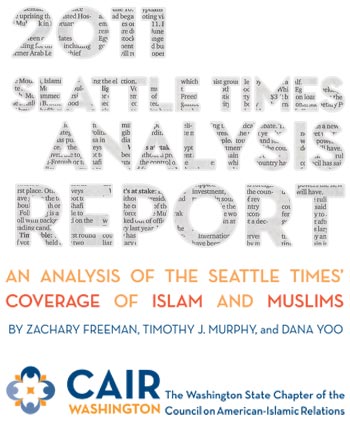CLICK HERE to download the full 2011 Seattle Times Article Analysis Report (1MB)

Executive Summary
This report was created in order to monitor, track and analyze coverage of Islam and Muslims in The Seattle Times during the year 2011. We believe the findings presented in this report provide a thorough and accurate report on these objectives. Each category produced unique conclusions that should be examined individually.
First, we flagged a significant number of articles for “informative and representative reporting.” We were pleased with the high number of these articles and urge The Times to continue producing such high-quality journalism that serves the reading public.
For “terminology,” we found that articles in The Times often failed to use precise and proper terminology when describing Muslim individuals or groups. The most glaring errors were the high volume of words such as “Islamist” and “jihad.” As discussed previously, these terms are almost always used incorrectly, do not benefit readers, and are in fact obstacles to readers’ understanding of issues.
For labeling disparity,” we found a strong trend toward labeling Muslims who commit violent acts as “terrorists,” while the apparent refusal to use the same language to describe non-Muslims who commit similar acts of violence. This has created an environment in which now only Muslims would be considered by readers as “terrorists” and is an obstacle to readers’ understanding of the nature of the crime and the possible motivations of the alleged perpetrators. Acts of violence and violent extremism and the actual action (e.g. shooter, shooting, bomber, bombing, etc.) should be used to describe the nature of the attack rather than “terrorism” which is a vague word that has become one that is racially loaded and seen to be specific to one religious group. This issue is exacerbated by the fact that there is still is no clear, broadly agreed-upon definition of the words terror, terrorism or terrorist. Further, we found a strong trend toward using ‘Islam’ as a qualifier for violence and terrorism. A clear policy on how and when a religious qualifier is used would address this. Additionally, if religious-based qualifiers are used, they must be used uniformly, across all religions.
In the section “biased and unbalanced reporting,” we found a limited number of articles that appeared overtly one-sided. These articles were fairly uncommon, yet we still feel it is important to bring attention to them, as they may misinform the reading public.
